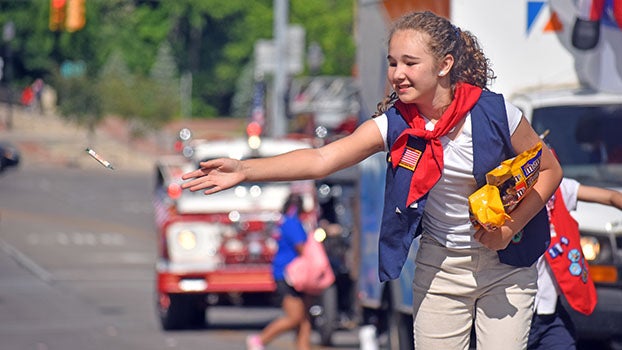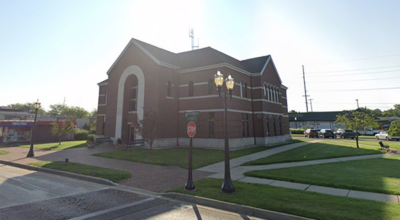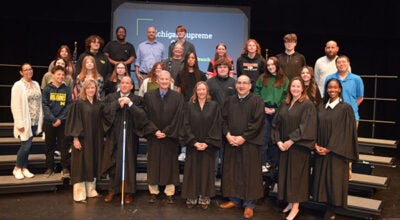Iraq: hot, sandy, loud
Published 10:46 pm Thursday, November 11, 2010

Ashley Lott and Tom File cooked in Iraq and in Vietnam — her for the Army and him for the Marines. (The Daily News/John Eby)
An elfin 4-foot-11 1/2, it’s hard to imagine Ashley Lott driving big rigs, but that’s what she did in 2004-05 in Iraq, which she remembers as “hot, sandy and loud.”
Lott, who left the Army in 2007, works in accounts receivable at the Radisson in Kalamazoo while attending H&R Block tax school.
She and another veteran visiting Justus Gage Elementary School for Veterans Day Thursday morning, Tom File, coincidentally both cooked, so the evolution of military cuisine as it pertains to serving eggs could be compared.
File, a retired hog farmer, joined the Marine Corps at 17 and served in Vietnam for 13 months in 1967-68.
Assigned to artillery, he recalled big guns which could shoot seven miles — equivalent to the distance between Dowagiac and Cassopolis.
His military service continued another 16 months stateside.
Lott enlisted her junior year of high school and went through basic training after graduation.
“I was a cook,” she said, “but my company’s job was to drive big semi trucks. I had to get up really, really early to feed a bunch of people, sweating over pots that were bigger than me. They made fun of me because I had to get on a milk crate.”
In December 2003, Lott was activated for Iraq, where she carried a semi-automatic rifle.
“We trained for 2 1/2 months” — ironic, considering their eventual desert destination — “in Wisconsin in December. If you think the winters are bad here, they cannot touch Wisconsin. You walked outside and your nose hairs froze. Not comfortable. We were out truckin’ in the snow, freezin’ our butts off, then we took off for Kuwait” for a few more months while waiting for their trucks to be “uparmored.”
“That means to put plexiglass — big, thick plastic — on the sides to stop bullets and shrapnel. We had big five-ton trucks that looked like huge dump trucks. Two people in the front and a big machine gun turret with sandbags around it.”
“There were insurgents all over the place,” she said of the nebulous enemy.
Lott, who served 11 months in Iraq, was stationed 40 minutes north of Baghdad with more comforts of home than File could imagine.
If you’re wondering why a cook was driving trucks, Lott explained, “I couldn’t cook because local nationals — they brought people over from India and Pakistan and from Iraq — under the supervision of U.S. civilians in our chow holes, so I didn’t have a job for a long time.
“Since my company was a trucking company, I hopped on and drove with them all over the place. We ran missions mostly in the daytime at first, but we were getting shot at too much, so went to nighttime. It worked well for a while until they caught on.”
Not only did she drive trucks, she had to learn to navigate in the dark without lights, but the stars were awesome.
Teacher Frank Barker asked how they spent free time so far from home.
File answered, “In Vietnam, you couldn’t go anyplace. You had to stay on your base. Stateside, I was married, so I lived off-base, so it was kind of like being a civilian when you weren’t working.”
“Anaconda is a very big base,” Lott said. “They got up and running a movie theater. We had Pizza Hut, Burger King and Subway. They didn’t taste the same, but it was good enough. We actually were able to get on laptop computers. My mom and I had video cams. I got to chat with Chase (her brother, a fifth grader in Bryan Henry’s class) and my family. We watched a lot of movies.”
Lott said of the heat, “It got up to 130 degrees plus. I was wearing this (camouflage uniform), a helmet, a vest with heavy plates and ammo magazines. It probably weighed 20 to 30 pounds. I had to wear that everyplace because of the threat of mortars dropping on the base. The helmet has a sweatband, but it’s non-absorbent,” so perspiration still ran down her face.
“I’m little,” she added, “so it bunched up and I always had this crease in my forehead that burned so bad.”
She was excited to get combat boots with an insole. “No more blisters. I love these.”
File added, “From all the sweating, it doesn’t smell very good. There wasn’t any way they were going to give us all new sweatbands.”
Of fixing breakfast, Lott said, “Your eggs were in a bag. Yellow jiggly stuff. You put them in a big pot, bag and all, and they boiled into scrambled eggs. We served them with hash browns and sausages.”
“They can put anything in a can,” File marveled. “Chicken in a can, turkey in a can. Back when I was in, there were powdered eggs you put water in and threw them on the grill. They stank.”
Henry, whose students send holiday care packages overseas, asked about the value of mail from home for morale.
“It was very appreciated because we weren’t around where you could go to a PX,” File said.
“Toothpaste, toothbrushes, candy bars, stuff like that, was very appreciated.”
“I loved getting mail,” Ashley added. “So many schools sent care packages, which were fun to open up and see what you guys think would mean something to us. It was really touching. I got a Superman shirt. Toothpaste, razors, shampoo, and all the letters. I worked in our little post office for a minute. At Christmas time, oh my word, we hung up all the little letters people wrote.”
After veterans gathered as a group in the media center for coffee, juice or water and doughnuts, they were paired off to visit classrooms, where the morning began with the Pledge of Allegiance.
Principal Marcy Hendress came over the public address and invoked a moment of silence “to think about our freedom we have because our veterans fought for it and how much that means to us or anything that’s very important to you related to today.
“We’re having a moment of silence because during the last year we lost two very important veterans,” Wesley Wilbanks and Edwin Darr.






